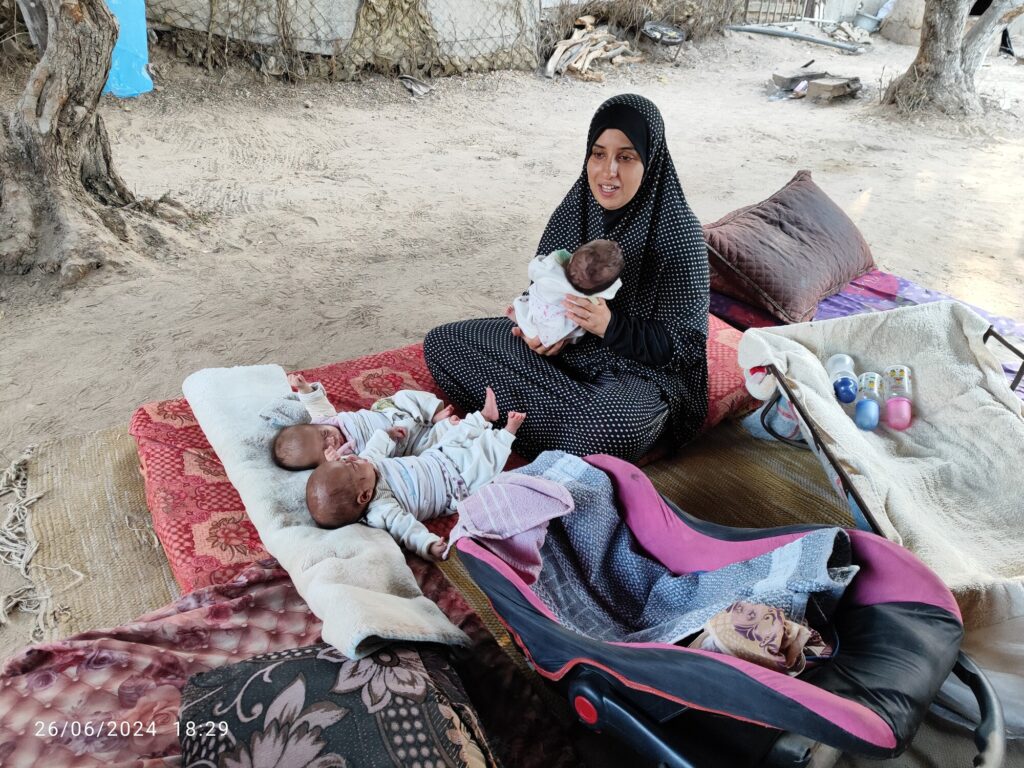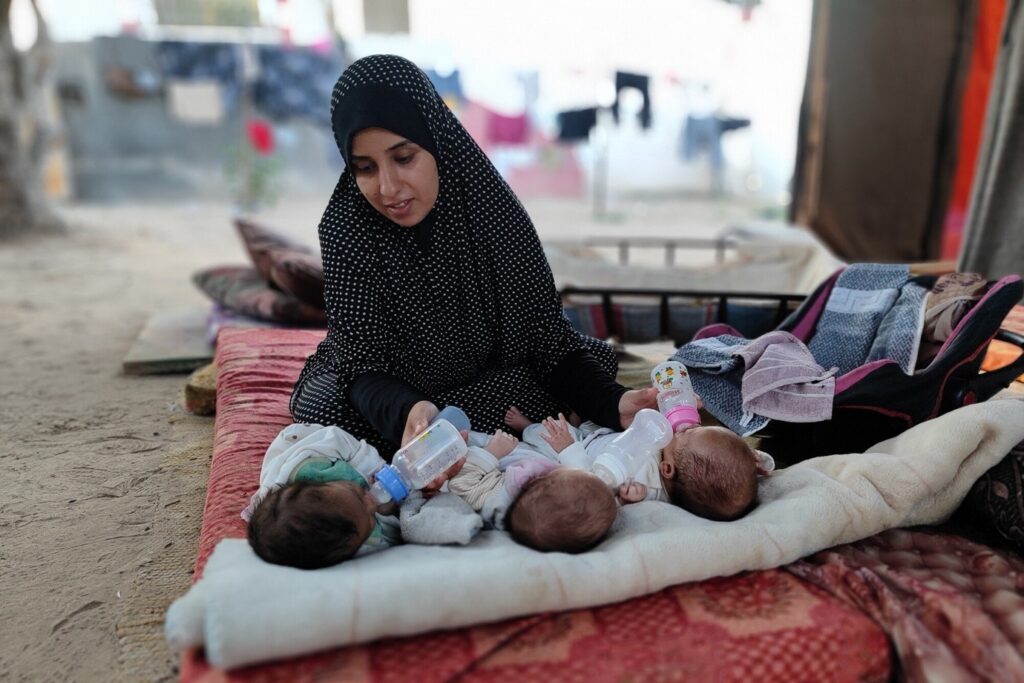For Yasmeen, a woman living in Gaza, the joy of conceiving after nine years of IVF was short-lived when war broke out just one and a half months after she became pregnant.
Not only was Yasmeen feeling terror over giving birth in a warzone, this feeling was exacerbated further when she found out she was expecting triplets.
“Before the war, my life was beautiful and full of happiness and joy. My husband and I were living a good life, and we lived in safety and security,” Yasmeen said.
“My biggest dream was to be blessed with children. Six months after getting married we started our IVF journey. It took 9 years for me to conceive.”
“When I found out I was pregnant, my husband was really happy and excited. We weren’t expecting this pregnancy because we had two rounds of IVF before this one that didn’t succeed. The success rate was very low.”
When Yasmeen was one and a half months pregnant, the war started, and she says the fear of not being able to find a hospital to give birth in was strong.
Yasmeen needed medication through her pregnancy and said she had to take anticoagulant injections because she was having triplets. Alongside taking vitamins and dietary supplements, she needed about 6-7 medications each month, which her husband struggled to acquire for her.
“My husband’s salary is not enough to support three children,” she said. “He used to get disability pay, but there is no liquidity in the banks for him to receive his monthly stipend.”
While Yasmeen was due to give birth at a hospital in Gaza City, they unfortunately weren’t able to accommodate her there. She needed a C-section and the hospital didn’t have anaesthetic for her surgery.
“They told me I should go to the south,” said Yasmeen. “My husband and I left Gaza City on our own through the checkpoint. I was using a wheelchair because my pregnancy was difficult and dangerous, and there was a high risk of miscarrying.”
“We said it’s ok, the war will last one to two months, we’ll have our children safely and then go back once the war is over. But this war has entered the ninth month and it’s still not over.”
Unfortunately, Yasmeen and her husband were forced to move several times due to heavy bombardment.
While the three babies thankfully arrived safely, Yasmeen’s birth wasn’t without challenges. The babies came two months early, and one had a pulmonary haemorrhage that required an incubator, but none were available.
Since then, Yasmeen, her husband and the three babies have had to stay in a tent near a hospital in case the premature children need medical care.

“My children are ok right now, but I had to take them to the hospital twice because of this pollution surrounding us, and the squalid living conditions in the tents,” she said. “No matter how hard you try to keep things clean, they are bound to catch something from all this pollution.”
Along with these struggles, Yasmeen and her family suffer from a lack of water and food, as prices increase. It’s especially hard for them to get formula milk for the babies. There aren’t mattresses for the babies to sleep on either, so Yasmeen has done her best to make things comfortable with blankets and towels.

“My message to the world is to intervene to end this war. We are tired and fed up, we are unable to withstand more than we already have anymore,” said Yasmeen.
“Our patience has run out, we can’t do this anymore. Show some mercy on these babies, they can’t live in this place. This place is full of pollution, it is not comfortable or clean.”
Pregnancy and childbirth in a conflict area
One in two women who die during pregnancy or childbirth is in a conflict area, with maternal mortality more than 40 times higher in fragile contexts than it is in developing countries, according to International NGO CARE Australia.
The research also shows that an estimated 35 million women gave birth in conflict zones in 2022, with the vast majority of them lacking medical care that meets basic standards of safety and quality.
These harrowing statistics, released ahead of CARE Australia’s ‘Maternal Health in Conflict’ appeal, highlight the reality for mothers around the world like Yasneem, who are disproportionately affected by conflict.
The appeal is supported by Human Rights Activist and former refugee Khadija Gbla, who fled conflict in Sierra Leone to come to Australia when she was a child with her mother and sibling. Gbla is now a mother herself.
“I’m supporting this campaign because I have first-hand experience of being in a conflict zone,” said Gbla.
“My mother had two daughters, one disabled and neurodiverse, and had to raise my sister and I after we were displaced.”
“As a parent myself now, I can’t imagine what that would have been like. I can’t imagine having to carry a baby, and then give birth, amongst the stress of conflict, let alone without adequate healthcare.”
“The very least these women deserve is a safe place to grow, birth and raise their children. Any parent I know would wish the same.”

In Gaza, pregnant women are 3 times more likely to miscarry and 3 times more likely to die in childbirth. In Sudan, two-thirds of health centres are not functioning, leaving the 150,000 odd pregnant women forcibly displaced by conflict, unable to access proper care.
Even when women are able to access required healthcare in conflict areas, they’re often left lacking access to nutrition, being forced to revert to harmful ways to feed their families, including eating less and less often.
In the Democratic Republic of Congo, which is facing persistent fighting, malnutrition threatens over 600,000 pregnant or breastfeeding women due to insufficient food.
The family role of breadwinner is often taken over by women as well, when men step away from their traditional roles to enter conflict. Sometimes this means women are the ones to flee with their families, often without their husbands.
“Mothers in conflict face innumerable challenges, including plummeting healthcare, at a time when these women are arguably most in need. These experiences often lead to higher death rates, even from preventable causes. The challenges are real, and we must do more to address them,” said Emily Janoch, one of the authors of CARE’s Women in War report.
CARE works to support women by training female health workers on maternal care and emergency obstetrics and funding health clinics in conflict areas with obstetric medical supplies so that women can safely deliver their babies.
Donations will go to support things such as providing immediate relief to pregnant women with a kit of essential supplies for birth and postnatal care to ensure mother and baby have everything they need for the first few days.
Anyone looking to support CARE Australia’s ‘Maternal Health in Conflict’ appeal can donate at https://www.care.org.au/appeals/maternal-health-conflict/.

